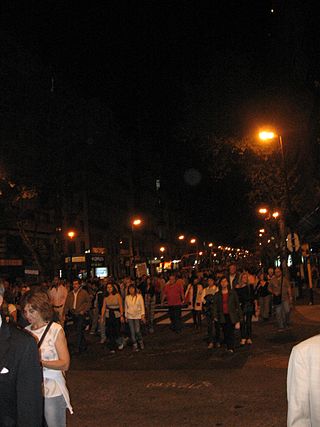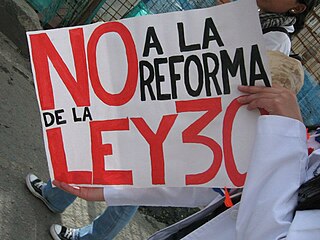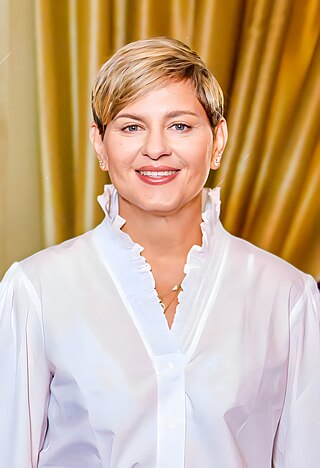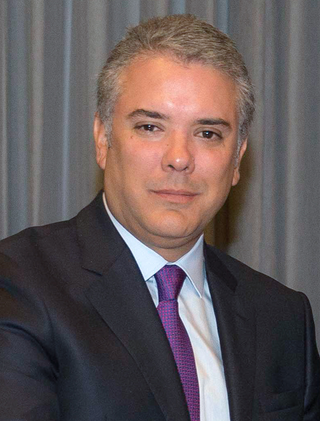
Gustavo Francisco Petro Urrego is a Colombian politician who is the 34th and current president of Colombia since 2022. Upon inauguration, he became the first left-wing president in the recent history of Colombia.

The 17A protests were a series of massive demonstrations in Argentina which took place on August 17, 2020, amid the COVID-19 pandemic, for several causes, among which: the defense of institutions and separation of powers, against a justice reform announced by the government, against the way quarantine was handled, the lack of liberty, the increase in theft, and a raise on state pensions.

The 18A was an Argentine cacerolazo that took place on April 18, 2013. Attended by nearly two million people, it was the largest demonstration at the time against the president Cristina Fernández de Kirchner.

The nations of Colombia and Mexico established diplomatic relations in 1821 when Colombia became the first country in Latin-America to recognize Mexico's independence. Both nations are members of the Association of Caribbean States, Community of Latin American and Caribbean States, Latin American Integration Association, Organization of American States, Organization of Ibero-American States, Pacific Alliance and the United Nations.

The 2011 Colombian student protests consisted of a series of demonstrations led by students, some teachers, university employees, and unions, starting on October 12. These demonstrations took place throughout the Colombian territory in protest against the draft of the Higher Education Reform Project presented by the National Government to the Congress of the Republic in October 2011.

Francia Elena Márquez Mina is a Colombian human-rights and environmental activist and lawyer, who is the 13th and current Vice President of Colombia. She was born in Yolombó, a village in the Suarez municipality in Cauca Department. She first became an activist at 13, when construction of a dam threatened her community. On taking office, she became the first Afro-Colombian vice president in the country's history. She is also the second woman to hold the post, after Marta Lucía Ramírez. In August 2020, Márquez announced her candidacy in the 2022 Colombian presidential election and sought the nomination for the Historic Pact for Colombia coalition. She was later chosen by the coalition's nominee, Gustavo Petro, to be his running mate. In 2023 she was also appointed as Minister for Equality and Equity.

The 2018 Nicaraguan protests began on 18 April 2018 when demonstrators in several cities of Nicaragua began protests against the social security reforms decreed by President Daniel Ortega that increased taxes and decreased benefits. After five days of unrest in which nearly thirty people were killed, Ortega announced the cancellation of the reforms; however, the opposition has grown through the 2014–2018 Nicaraguan protests to denounce Ortega and demand his resignation, becoming one of the largest protests in his government's history and the deadliest civil conflict since the end of the Nicaraguan Revolution. On 29 September 2018, political demonstrations were declared illegal by President Ortega.

A series of massive demonstrations and severe riots, known in Chile as the Estallido Social, originated in Santiago and took place in all regions of Chile, with a greater impact in the regional capitals. The protests mainly occurred between October 2019 and March 2020, in response to a raise in the Santiago Metro's subway fare, a probity crisis, cost of living, university graduate unemployment, privatisation, and inequality prevalent in the country.

The 2020 Peruvian protests were a series of demonstrations sparked after the removal of President Martín Vizcarra that took place from 9 November to 17 November 2020.

Presidential elections were held in Colombia on 29 May 2022, with a runoff on 19 June 2022 as no candidate obtained at least 50% in the first round of voting. Iván Duque, who was elected president in 2018, was ineligible to run due to term limits. Gustavo Petro, a senator, former Mayor of Bogota, and runner-up in the 2018 election, defeated Rodolfo Hernández Suárez, former mayor of Bucaramanga, in the runoff election. Petro's victory made him the first left-wing candidate to be elected president of Colombia, and his running mate, Francia Márquez, is the first Afro-Colombian elected to the vice-presidency, as well as the second female vice-president overall.

A series of protests began in Colombia on 28 April 2021 against increased taxes, corruption, and health care reform proposed by the government of President Iván Duque. The tax initiative was introduced to expand funding to Ingreso Solidario, a universal basic income social program established in April 2020 to provide relief during the COVID-19 pandemic in Colombia, while the legislative Bill 010 proposed several changes in the health care system in Colombia.

The Historic Pact for Colombia is a political and electoral coalition in Colombia composed of political parties and social movements with ideologies ranging from the centre-left, left-wing, and far-left. It is the current Government Coalition in Colombia after the 2022 presidential elections.

Verónica del Socorro Alcocer García is a Colombian philanthropist and the current First Lady of Colombia since 2022, as the third wife of President Gustavo Petro.

Gustavo Petro assumed office as President of Colombia on August 7, 2022. The President has the power to nominate members of his Cabinet at his own discretion, in accordance with the Constitution of Colombia.

Álvaro Leyva Durán is a Colombian lawyer, economist, politician, human rights defender and diplomat. He has been the Minister of Foreign Affairs for Colombia in the government of Gustavo Petro since 7 August 2022. On 7 February 2024, he was suspended from his ministerial position for three months over an investigation into potential violations of procurement laws.

Gustavo Petro's term as the 34th president of Colombia began with his inauguration on 7 August 2022. Petro who previously served as mayor of Bogotá, took office after his victory in the 2022 presidential election over the self-proclaimed "anti-corruption leader" Rodolfo Hernández. Petro took office amid the political shadow of his predecessor, an economic crisis and increased political polarization.

Iván Duque's term as the 33rd president of Colombia began with his inauguration on August 7, 2018, and ended on August 7, 2022. Duque a right-wing leader from Bogotá, D.C., took office after a narrow victory over the incumbent leader of Human Colombia Gustavo Petro in the 2018 presidential election. Duque was succeeded by Gustavo Petro, who won the 2022 presidential election.

Following the ousting of president of Peru, Pedro Castillo on 7 December 2022, a series of political protests against the government of president Dina Boluarte and the Congress of Peru occurred. The demonstrations lack centralized leadership and originated primarily among grassroots movements and social organizations on the left to far-left, as well as indigenous communities, who feel politically disenfranchised. Castillo was removed from office and arrested after announcing the illegal dissolution of Congress, the intervention of the state apparatus, and the forced establishment of an "emergency government", which was characterized as a self-coup attempt by all government institutions, all professional institutions, and mainstream media in Peru while Castillo's supporters said that Congress attempted to overthrow Castillo. Castillo's successor Dina Boluarte, along with Congress, were widely disapproved, with the two receiving the lowest approval ratings among public offices in the Americas. Among the main demands of the demonstrators are the dissolution of Congress, the resignation of Boluarte, new general elections, the release of Castillo, and the formation of a constituent assembly to draft a new constitution. It has also been reported that some of the protesters have declared an insurgency in Punos's region. Analysts, businesses, and voters said that immediate elections are necessary to prevent future unrest, although many establishment political parties have little public support.

A series of protests occurred in Colombia on 21 April 2024 against the administration of president Gustavo Petro. Motivations for the protests were diverse, such as concerns about low morale among the public force, as well as opposition to several Petro-led reforms, as well as to his proposal for the creation of a constitutional assembly. Assistants to the protests included members of the opposition, as well as former Petro supporters and healthcare workers. Much of the opposition is due to the governments move to a public-funded healthcare system and moving away from privatized healthcare.

















